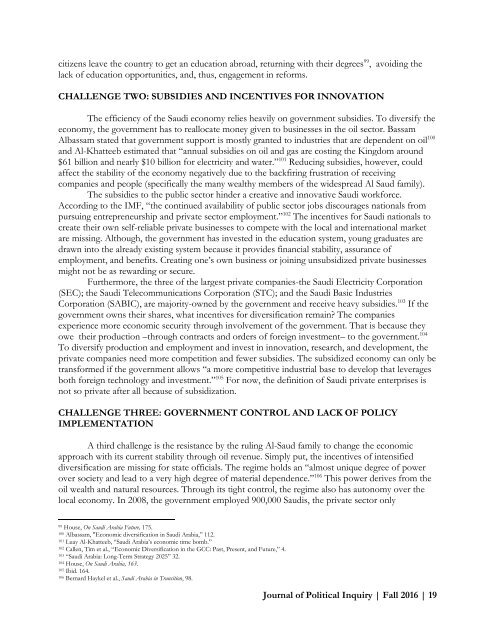Fall2016_Final2
Create successful ePaper yourself
Turn your PDF publications into a flip-book with our unique Google optimized e-Paper software.
citizens leave the country to get an education abroad, returning with their degrees 99 , avoiding the<br />
lack of education opportunities, and, thus, engagement in reforms.<br />
CHALLENGE TWO: SUBSIDIES AND INCENTIVES FOR INNOVATION<br />
The efficiency of the Saudi economy relies heavily on government subsidies. To diversify the<br />
economy, the government has to reallocate money given to businesses in the oil sector. Bassam<br />
Albassam stated that government support is mostly granted to industries that are dependent on oil 100<br />
and Al-Khatteeb estimated that “annual subsidies on oil and gas are costing the Kingdom around<br />
$61 billion and nearly $10 billion for electricity and water.” 101 Reducing subsidies, however, could<br />
affect the stability of the economy negatively due to the backfiring frustration of receiving<br />
companies and people (specifically the many wealthy members of the widespread Al Saud family).<br />
The subsidies to the public sector hinder a creative and innovative Saudi workforce.<br />
According to the IMF, “the continued availability of public sector jobs discourages nationals from<br />
pursuing entrepreneurship and private sector employment.” 102 The incentives for Saudi nationals to<br />
create their own self-reliable private businesses to compete with the local and international market<br />
are missing. Although, the government has invested in the education system, young graduates are<br />
drawn into the already existing system because it provides financial stability, assurance of<br />
employment, and benefits. Creating one’s own business or joining unsubsidized private businesses<br />
might not be as rewarding or secure.<br />
Furthermore, the three of the largest private companies-the Saudi Electricity Corporation<br />
(SEC); the Saudi Telecommunications Corporation (STC); and the Saudi Basic Industries<br />
Corporation (SABIC), are majority-owned by the government and receive heavy subsidies. 103 If the<br />
government owns their shares, what incentives for diversification remain? The companies<br />
experience more economic security through involvement of the government. That is because they<br />
owe their production –through contracts and orders of foreign investment– to the government. 104<br />
To diversify production and employment and invest in innovation, research, and development, the<br />
private companies need more competition and fewer subsidies. The subsidized economy can only be<br />
transformed if the government allows “a more competitive industrial base to develop that leverages<br />
both foreign technology and investment.” 105 For now, the definition of Saudi private enterprises is<br />
not so private after all because of subsidization.<br />
CHALLENGE THREE: GOVERNMENT CONTROL AND LACK OF POLICY<br />
IMPLEMENTATION<br />
A third challenge is the resistance by the ruling Al-Saud family to change the economic<br />
approach with its current stability through oil revenue. Simply put, the incentives of intensified<br />
diversification are missing for state officials. The regime holds an “almost unique degree of power<br />
over society and lead to a very high degree of material dependence.” 106 This power derives from the<br />
oil wealth and natural resources. Through its tight control, the regime also has autonomy over the<br />
local economy. In 2008, the government employed 900,000 Saudis, the private sector only<br />
99<br />
House, On Saudi Arabia Future, 175.<br />
100<br />
Albassam, "Economic diversification in Saudi Arabia,” 112.<br />
101<br />
Luay Al-Khatteeb, “Saudi Arabia’s economic time bomb.”<br />
102<br />
Callen, Tim et al., “Economic Diversification in the GCC: Past, Present, and Future,” 4.<br />
103<br />
“Saudi Arabia: Long-Term Strategy 2025” 32.<br />
104<br />
House, On Saudi Arabia, 163.<br />
105<br />
Ibid. 164.<br />
106<br />
Bernard Haykel et al., Saudi Arabia in Transition, 98.<br />
Journal of Political Inquiry | Fall 2016 | 19
















